The Cambridge History of Japan, Vol. 4: Early Modern Japan
Подождите немного. Документ загружается.

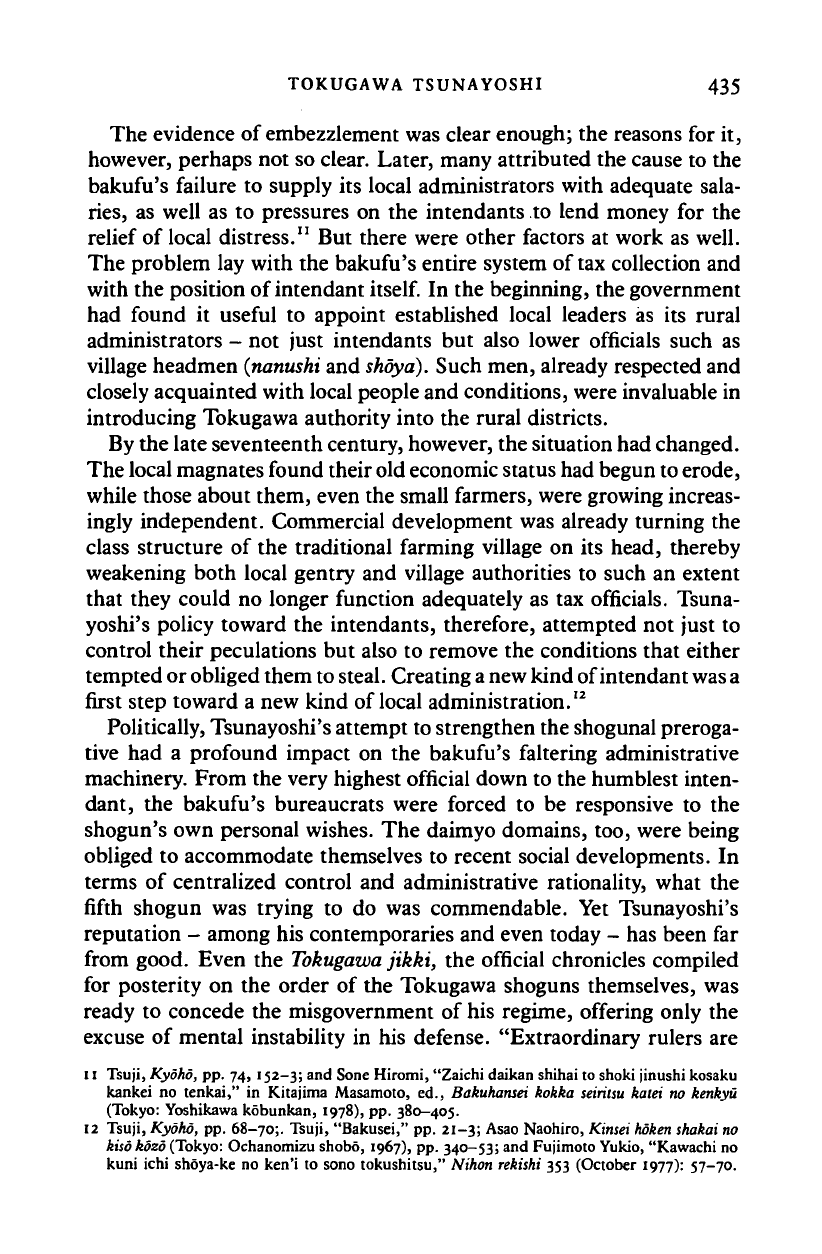
TOKUGAWA TSUNAYOSHI 435
The evidence of embezzlement was clear enough; the reasons for it,
however, perhaps not so clear. Later, many attributed the cause to the
bakufu's failure to supply its local administrators with adequate sala-
ries,
as well as to pressures on the intendants to lend money for the
relief of local distress." But there were other factors at work as well.
The problem lay with the bakufu's entire system of tax collection and
with the position of intendant
itself.
In the beginning, the government
had found it useful to appoint established local leaders as its rural
administrators - not just intendants but also lower officials such as
village headmen
(nanushi
and
shoya).
Such men, already respected and
closely acquainted with local people and conditions, were invaluable in
introducing Tokugawa authority into the rural districts.
By the late seventeenth century, however, the situation had changed.
The local magnates found their old economic status had begun
to
erode,
while those about them, even the small farmers, were growing increas-
ingly independent. Commercial development was already turning the
class structure of the traditional farming village on its head, thereby
weakening both local gentry and village authorities to such an extent
that they could no longer function adequately as tax officials. Tsuna-
yoshi's policy toward the intendants, therefore, attempted not just to
control their peculations but also to remove the conditions that either
tempted or obliged them
to
steal.
Creating
a new
kind of intendant
was a
first step toward a new kind of
local
administration.
12
Politically, Tsunayoshi's attempt to strengthen the shogunal preroga-
tive had a profound impact on the bakufu's faltering administrative
machinery. From the very highest official down to the humblest inten-
dant, the bakufu's bureaucrats were forced to be responsive to the
shogun's own personal wishes. The daimyo domains, too, were being
obliged to accommodate themselves to recent social developments. In
terms of centralized control and administrative rationality, what the
fifth shogun was trying to do was commendable. Yet Tsunayoshi's
reputation - among his contemporaries and even today - has been far
from good. Even the
Tokugawa
jikki, the official chronicles compiled
for posterity on the order of the Tokugawa shoguns themselves, was
ready to concede the misgovernment of his regime, offering only the
excuse of mental instability in his defense. "Extraordinary rulers are
11 Tsuji,
Kyohd,
pp. 74, 152-3; and Sone Hiromi, "Zaichi daikan shihai to shoki jinushi kosaku
kankei no tenkai," in Kitajima Masamoto, ed., Bakuhansei kokka
seiritsu
katei no kenkyu
(Tokyo: Yoshikawa kobunkan, 1978), pp. 380-405.
12 Tsuji,
Kyohd,
pp. 68-70;. Tsuji, "Bakusei," pp. 21-3; Asao Naohiro, Kinsei
hoken
shakai no
kiso kozo (Tokyo: Ochanomizu shobo, 1967), pp. 340-53; and Fujimoto Yukio, "Kawachi no
kuni ichi shoya-ke no ken'i to sono tokushitsu," Nihon rekishi 353 (October 1977): 57-70.
Cambridge Histories Online © Cambridge University Press, 2008
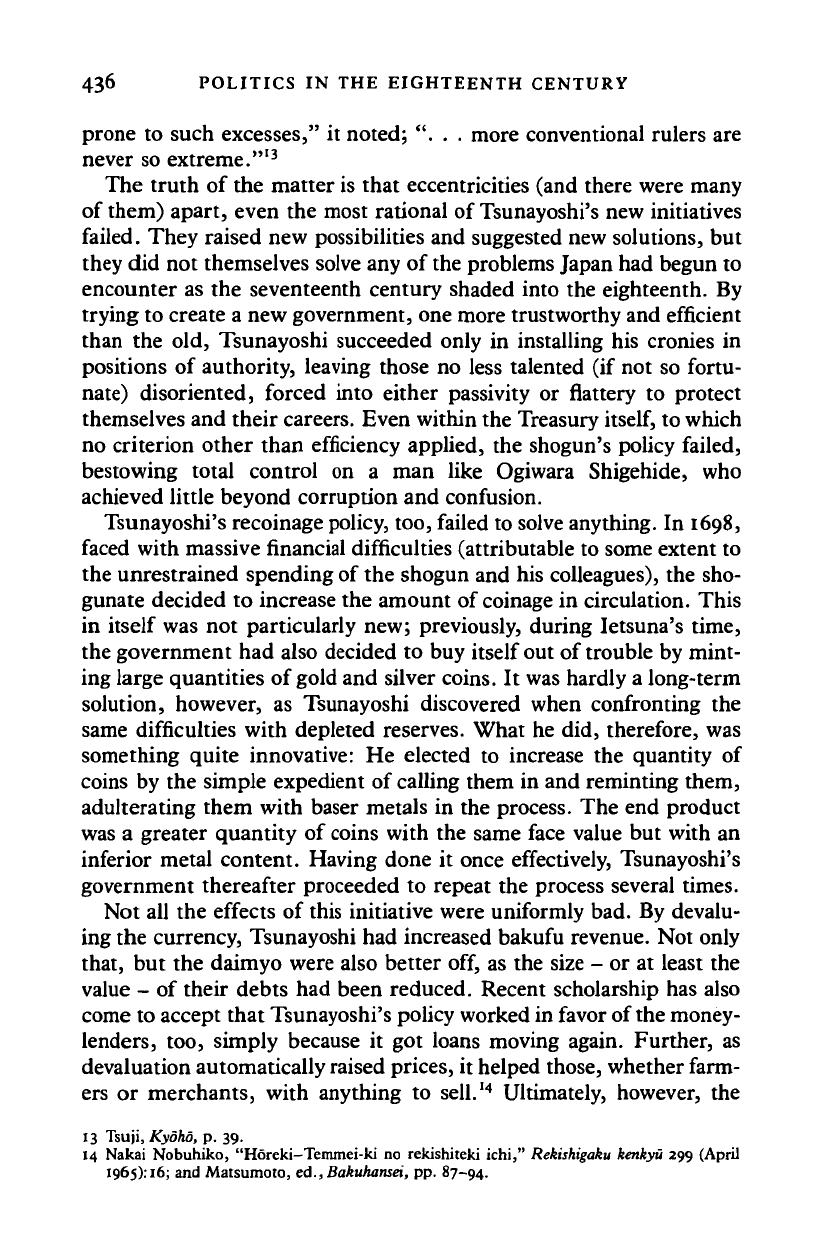
436 POLITICS IN THE EIGHTEENTH CENTURY
prone to such excesses," it noted; ". . . more conventional rulers are
never so extreme.'"
3
The truth of the matter is that eccentricities (and there were many
of them) apart, even the most rational of Tsunayoshi's new initiatives
failed. They raised new possibilities and suggested new solutions, but
they did not themselves solve any of the problems Japan had begun to
encounter as the seventeenth century shaded into the eighteenth. By
trying to create a new government, one more trustworthy and efficient
than the old, Tsunayoshi succeeded only in installing his cronies in
positions of authority, leaving those no less talented (if not so fortu-
nate) disoriented, forced into either passivity or flattery to protect
themselves and their careers. Even within the Treasury
itself,
to which
no criterion other than efficiency applied, the shogun's policy failed,
bestowing total control on a man like Ogiwara Shigehide, who
achieved little beyond corruption and confusion.
Tsunayoshi's recoinage policy, too, failed to solve anything. In 1698,
faced with massive financial difficulties (attributable to some extent to
the unrestrained spending of the shogun and his colleagues), the sho-
gunate decided to increase the amount of coinage in circulation. This
in itself was not particularly new; previously, during Ietsuna's time,
the government had also decided to buy itself out of trouble by mint-
ing large quantities of gold and silver coins. It was hardly a long-term
solution, however, as Tsunayoshi discovered when confronting the
same difficulties with depleted reserves. What he did, therefore, was
something quite innovative: He elected to increase the quantity of
coins by the simple expedient of calling them in and reminting them,
adulterating them with baser metals in the process. The end product
was a greater quantity of coins with the same face value but with an
inferior metal content. Having done it once effectively, Tsunayoshi's
government thereafter proceeded to repeat the process several times.
Not all the effects of this initiative were uniformly bad. By devalu-
ing the currency, Tsunayoshi had increased bakufu revenue. Not only
that, but the daimyo were also better off, as the size - or at least the
value - of their debts had been reduced. Recent scholarship has also
come to accept that Tsunayoshi's policy worked in favor of the money-
lenders, too, simply because it got loans moving again. Further, as
devaluation automatically raised prices, it helped those, whether farm-
ers or merchants, with anything to sell.
14
Ultimately, however, the
13 Tsuji, Kyoho, p. 39.
14 Nakai Nobuhiko, "Horeki-Temmei-ki no rekishiteki ichi," Rekishigaku kenkyu 299 (April
I965):i6; and Matsumoto, ed., Bakuhansei, pp. 87-94.
Cambridge Histories Online © Cambridge University Press, 2008
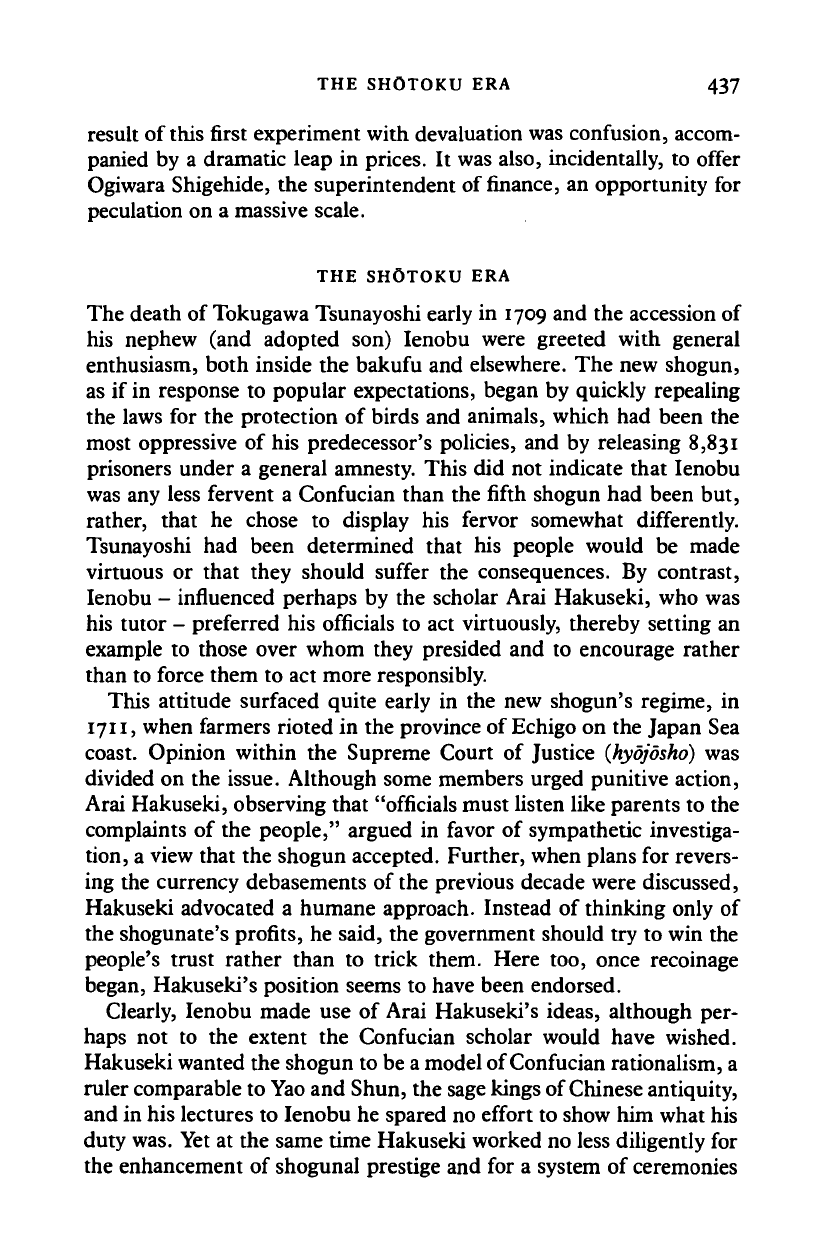
THE
SHOTOKU
ERA 437
result of
this
first experiment with devaluation was confusion, accom-
panied by a dramatic leap in prices. It was also, incidentally, to offer
Ogiwara Shigehide, the superintendent of finance, an opportunity for
peculation on a massive scale.
THE
SHOTOKU ERA
The death of Tokugawa Tsunayoshi early in 1709 and the accession of
his nephew (and adopted son) Ienobu were greeted with general
enthusiasm, both inside the bakufu and elsewhere. The new shogun,
as if in response to popular expectations, began by quickly repealing
the laws for the protection of birds and animals, which had been the
most oppressive of his predecessor's policies, and by releasing 8,831
prisoners under a general amnesty. This did not indicate that Ienobu
was any less fervent a Confucian than the fifth shogun had been but,
rather, that he chose to display his fervor somewhat differently.
Tsunayoshi had been determined that his people would be made
virtuous or that they should suffer the consequences. By contrast,
Ienobu - influenced perhaps by the scholar Arai Hakuseki, who was
his tutor - preferred his officials to act virtuously, thereby setting an
example to those over whom they presided and to encourage rather
than to force them to act more responsibly.
This attitude surfaced quite early in the new shogun's regime, in
1711,
when farmers rioted in the province of Echigo on the Japan Sea
coast. Opinion within the Supreme Court of Justice
(hyojosho)
was
divided on the issue. Although some members urged punitive action,
Arai Hakuseki, observing that "officials must listen like parents to the
complaints of the people," argued in favor of sympathetic investiga-
tion, a view that the shogun accepted. Further, when plans for revers-
ing the currency debasements of the previous decade were discussed,
Hakuseki advocated a humane approach. Instead of thinking only of
the shogunate's profits, he said, the government should try to win the
people's trust rather than to trick them. Here too, once recoinage
began, Hakuseki's position seems to have been endorsed.
Clearly, Ienobu made use of Arai Hakuseki's ideas, although per-
haps not to the extent the Confucian scholar would have wished.
Hakuseki wanted the shogun to be a model of Confucian rationalism, a
ruler comparable to
Yao
and Shun, the sage kings of Chinese antiquity,
and in his lectures to Ienobu he spared no effort to show him what his
duty was. Yet at the same time Hakuseki worked no less diligently for
the enhancement of shogunal prestige and for a system of ceremonies
Cambridge Histories Online © Cambridge University Press, 2008
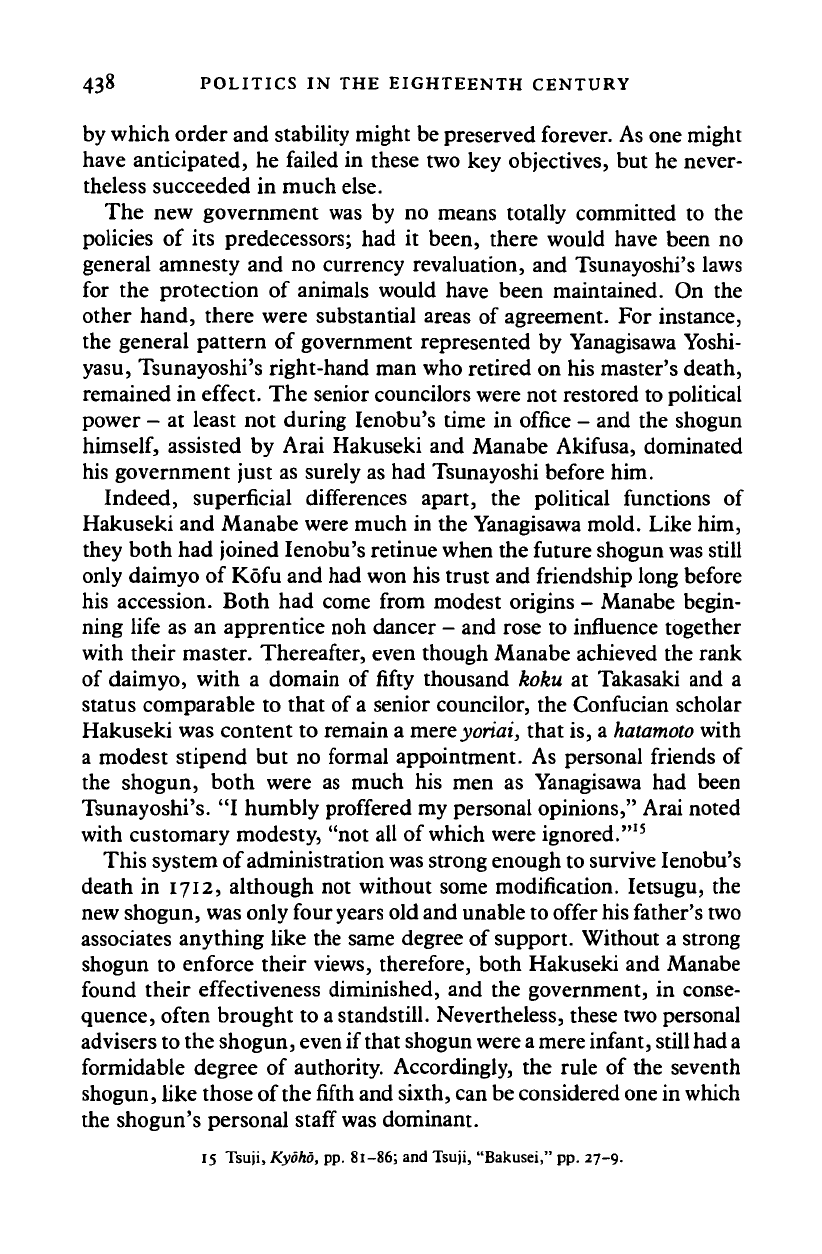
438 POLITICS IN THE EIGHTEENTH CENTURY
by which order and stability might be preserved forever. As one might
have anticipated, he failed in these two key objectives, but he never-
theless succeeded in much else.
The new government was by no means totally committed to the
policies of its predecessors; had it been, there would have been no
general amnesty and no currency revaluation, and Tsunayoshi's laws
for the protection of animals would have been maintained. On the
other hand, there were substantial areas of agreement. For instance,
the general pattern of government represented by Yanagisawa Yoshi-
yasu, Tsunayoshi's right-hand man who retired on his master's death,
remained in effect. The senior councilors were not restored to political
power - at least not during Ienobu's time in office - and the shogun
himself,
assisted by Arai Hakuseki and Manabe Akifusa, dominated
his government just as surely as had Tsunayoshi before him.
Indeed, superficial differences apart, the political functions of
Hakuseki and Manabe were much in the Yanagisawa mold. Like him,
they both had joined Ienobu's retinue when the future shogun was still
only daimyo of Kofu and had won his trust and friendship long before
his accession. Both had come from modest origins - Manabe begin-
ning life as an apprentice noh dancer - and rose to influence together
with their master. Thereafter, even though Manabe achieved the rank
of daimyo, with a domain of fifty thousand koku at Takasaki and a
status comparable to that of
a
senior councilor, the Confucian scholar
Hakuseki was content to remain a mereyoriai, that is, a
hatamoto
with
a modest stipend but no formal appointment. As personal friends of
the shogun, both were as much his men as Yanagisawa had been
Tsunayoshi's. "I humbly proffered my personal opinions," Arai noted
with customary modesty, "not all of which were ignored."
15
This system of administration was strong enough to survive Ienobu's
death in 1712, although not without some modification. Ietsugu, the
new shogun, was only four years old and unable to offer
his
father's two
associates anything like the same degree of support. Without a strong
shogun to enforce their views, therefore, both Hakuseki and Manabe
found their effectiveness diminished, and the government, in conse-
quence, often brought to
a
standstill. Nevertheless, these two personal
advisers to the shogun, even if that shogun were
a
mere infant,
still
had
a
formidable degree of authority. Accordingly, the rule of the seventh
shogun, like those of the
fifth
and sixth, can be considered one in which
the shogun's personal staff
was
dominant.
15 Tsuji, Kyoho, pp. 81-86; and Tsuji, "Bakusei," pp. 27-9.
Cambridge Histories Online © Cambridge University Press, 2008
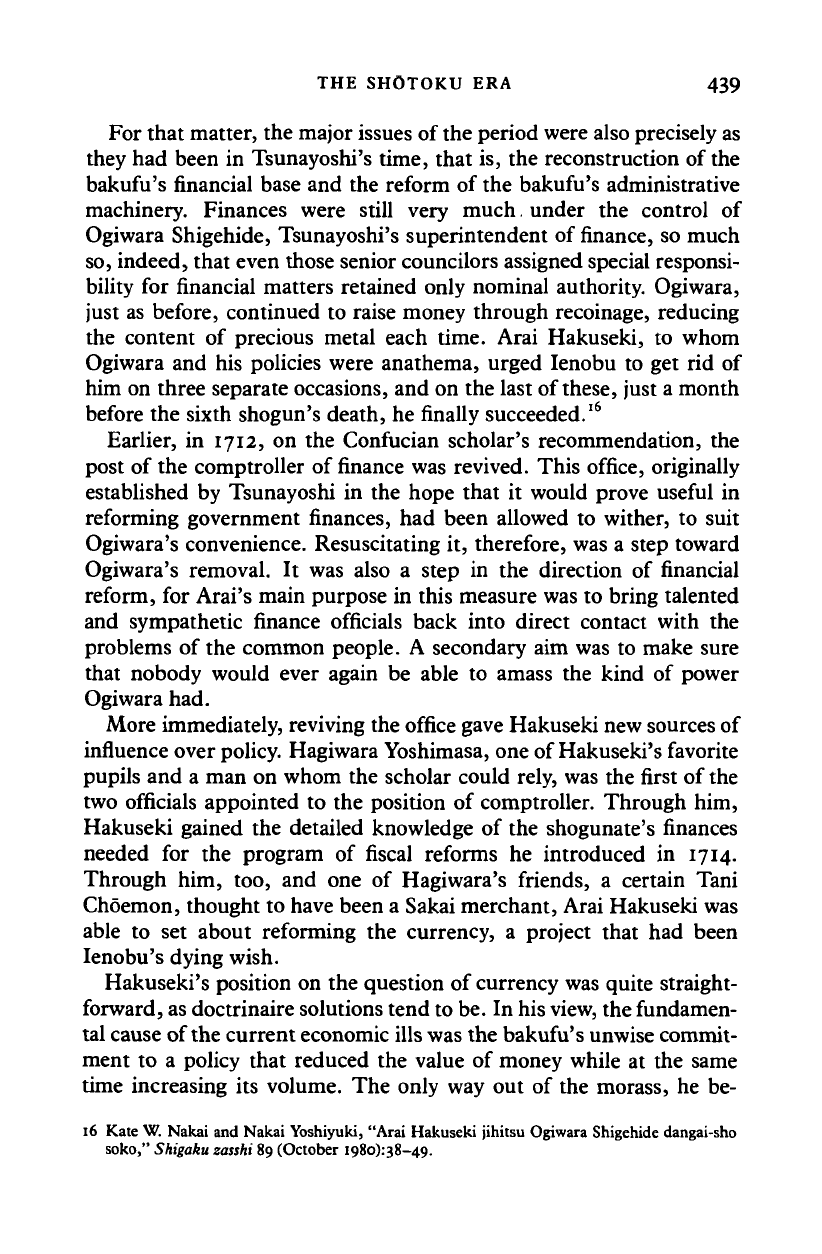
THE
SHOTOKU
ERA 439
For that matter, the major issues of the period were also precisely as
they had been in Tsunayoshi's time, that is, the reconstruction of the
bakufu's financial base and the reform of the bakufu's administrative
machinery. Finances were still very much, under the control of
Ogiwara Shigehide, Tsunayoshi's superintendent of finance, so much
so,
indeed, that even those senior councilors assigned special responsi-
bility for financial matters retained only nominal authority. Ogiwara,
just as before, continued to raise money through recoinage, reducing
the content of precious metal each time. Arai Hakuseki, to whom
Ogiwara and his policies were anathema, urged Ienobu to get rid of
him on three separate occasions, and on the last of
these,
just a month
before the sixth shogun's death, he finally succeeded.
16
Earlier, in 1712, on the Confucian scholar's recommendation, the
post of the comptroller of finance was revived. This office, originally
established by Tsunayoshi in the hope that it would prove useful in
reforming government finances, had been allowed to wither, to suit
Ogiwara's convenience. Resuscitating it, therefore, was a step toward
Ogiwara's removal. It was also a step in the direction of financial
reform, for Arai's main purpose in this measure was to bring talented
and sympathetic finance officials back into direct contact with the
problems of the common people. A secondary aim was to make sure
that nobody would ever again be able to amass the kind of power
Ogiwara had.
More immediately, reviving the office gave Hakuseki new sources of
influence over policy. Hagiwara Yoshimasa, one of Hakuseki's favorite
pupils and a man on whom the scholar could rely, was the first of the
two officials appointed to the position of comptroller. Through him,
Hakuseki gained the detailed knowledge of the shogunate's finances
needed for the program of fiscal reforms he introduced in 1714.
Through him, too, and one of Hagiwara's friends, a certain Tani
Choemon, thought to have been a Sakai merchant, Arai Hakuseki was
able to set about reforming the currency, a project that had been
Ienobu's dying wish.
Hakuseki's position on the question of currency was quite straight-
forward, as doctrinaire solutions tend to
be.
In his
view,
the fundamen-
tal cause of the current economic ills was the bakufu's unwise commit-
ment to a policy that reduced the value of money while at the same
time increasing its volume. The only way out of the morass, he be-
16 Kate
W.
Nakai and Nakai Yoshiyuki, "Arai Hakuseki jihitsu Ogiwara Shigehide dangai-sho
soko,"
Shigaku
zasshi
89 (October i98o):38-49.
Cambridge Histories Online © Cambridge University Press, 2008
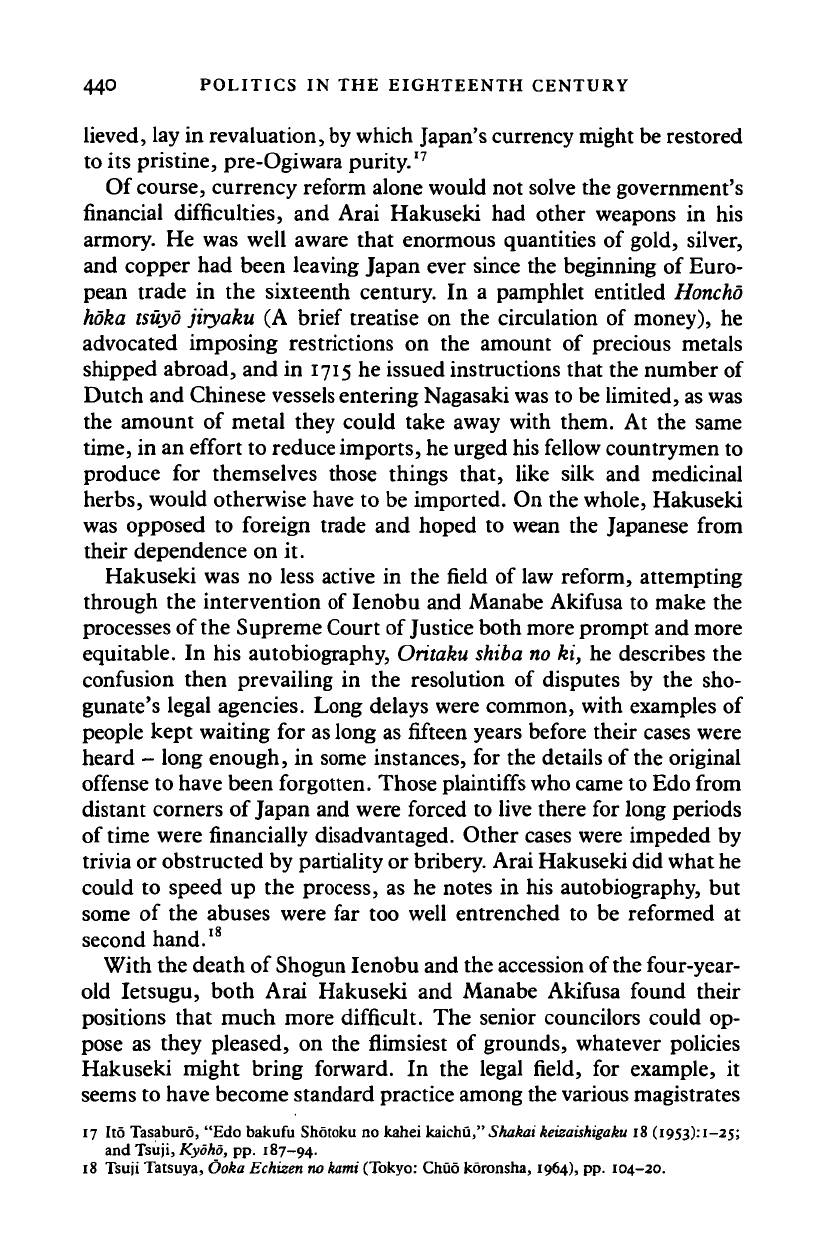
440 POLITICS IN THE EIGHTEENTH CENTURY
lieved, lay in revaluation,
by
which Japan's currency might be restored
to its pristine, pre-Ogiwara purity.
I7
Of
course,
currency reform alone would not solve the government's
financial difficulties, and Arai Hakuseki had other weapons in his
armory. He was well aware that enormous quantities of gold, silver,
and copper had been leaving Japan ever since the beginning of Euro-
pean trade in the sixteenth century. In a pamphlet entitled
Honcho
hoka
tsuyo
jityaku (A brief treatise on the circulation of money), he
advocated imposing restrictions on the amount of precious metals
shipped abroad, and in 1715 he issued instructions that the number of
Dutch and Chinese vessels entering Nagasaki was to be limited, as was
the amount of metal they could take away with them. At the same
time,
in an effort to reduce imports, he urged his fellow countrymen to
produce for themselves those things that, like silk and medicinal
herbs,
would otherwise have to be imported. On the whole, Hakuseki
was opposed to foreign trade and hoped to wean the Japanese from
their dependence on it.
Hakuseki was no less active in the field of law reform, attempting
through the intervention of Ienobu and Manabe Akifusa to make the
processes of the Supreme Court of Justice both more prompt and more
equitable. In his autobiography, Oritaku
shiba
no ki, he describes the
confusion then prevailing in the resolution of disputes by the sho-
gunate's legal agencies. Long delays were common, with examples of
people kept waiting for as long as fifteen years before their cases were
heard - long enough, in some instances, for the details of the original
offense to have been forgotten. Those plaintiffs who came to Edo from
distant corners of Japan and were forced to live there for long periods
of time were financially disadvantaged. Other cases were impeded by
trivia or obstructed by partiality or bribery. Arai Hakuseki did what he
could to speed up the process, as he notes in his autobiography, but
some of the abuses were far too well entrenched to be reformed at
second hand.
18
With the death of Shogun Ienobu and the accession of the four-year-
old Ietsugu, both Arai Hakuseki and Manabe Akifusa found their
positions that much more difficult. The senior councilors could op-
pose as they pleased, on the flimsiest of grounds, whatever policies
Hakuseki might bring forward. In the legal field, for example, it
seems to have become standard practice among the various magistrates
17 ltd Tasaburo, "Edo bakufu Shotoku no kahei kaichu,"
Shaken
keizaishigaku 18
(1953):
1-25;
and Tsuji, Kydho, pp. 187-94.
18 Tsuji Tatsuya, Ooka Echizen no
kami
(Tokyo: Chuo koronsha, 1964), pp. 104-20.
Cambridge Histories Online © Cambridge University Press, 2008
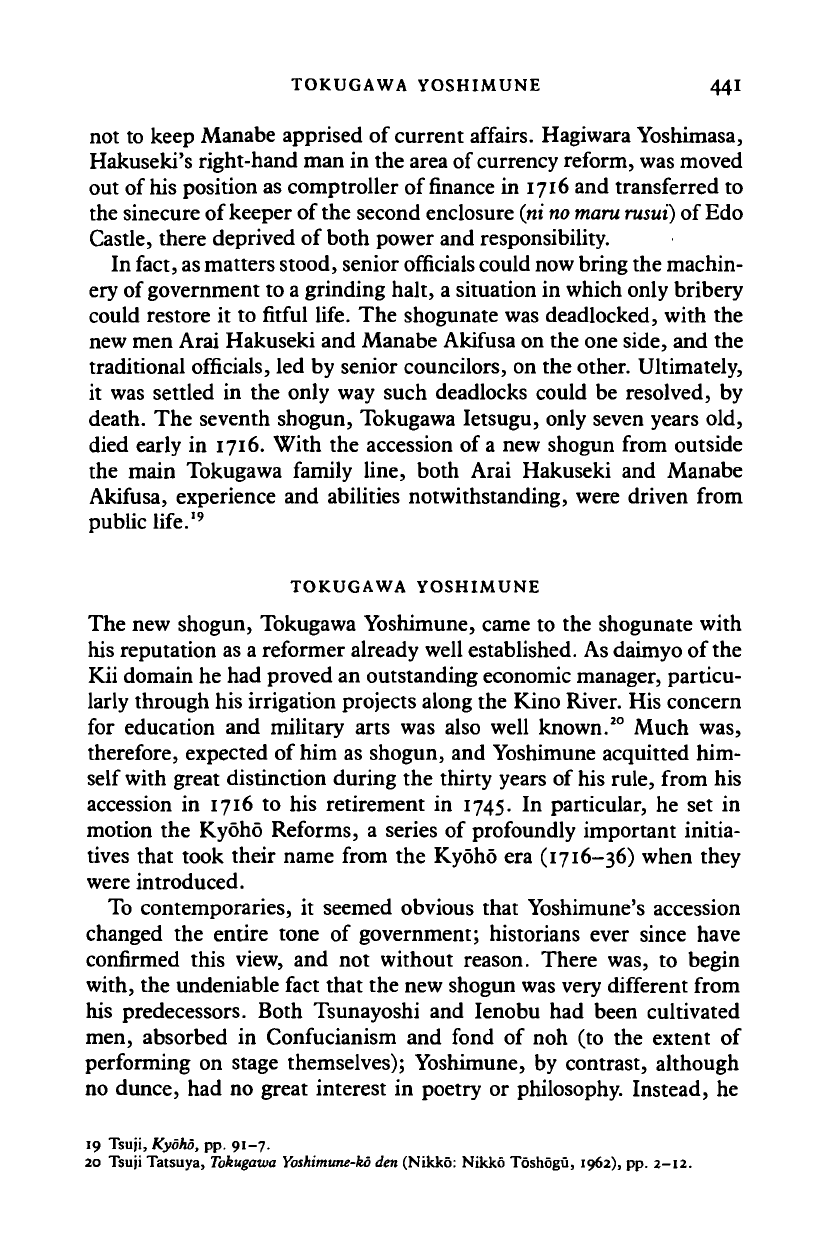
TOKUGAWA YOSHIMUNE 441
not to keep Manabe apprised of current affairs. Hagiwara Yoshimasa,
Hakuseki's right-hand man in the area of currency reform, was moved
out of his position as comptroller of
finance
in 1716 and transferred to
the sinecure of keeper of the second enclosure
(ni no maru rusut)
of Edo
Castle, there deprived of both power and responsibility.
In fact,
as
matters stood, senior officials could now bring the machin-
ery of government to a grinding halt, a situation in which only bribery
could restore it to fitful life. The shogunate was deadlocked, with the
new men Arai Hakuseki and Manabe Akifusa on the one side, and the
traditional officials, led by senior councilors, on the other. Ultimately,
it was settled in the only way such deadlocks could be resolved, by
death. The seventh shogun, Tokugawa Ietsugu, only seven years old,
died early in 1716. With the accession of a new shogun from outside
the main Tokugawa family line, both Arai Hakuseki and Manabe
Akifusa, experience and abilities notwithstanding, were driven from
public life.
19
TOKUGAWA YOSHIMUNE
The new shogun, Tokugawa Yoshimune, came to the shogunate with
his reputation as a reformer already well established. As daimyo of the
Kii domain he had proved an outstanding economic manager, particu-
larly through his irrigation projects along the Kino River. His concern
for education and military arts was also well known.
20
Much was,
therefore, expected of him as shogun, and Yoshimune acquitted him-
self with great distinction during the thirty years of his rule, from his
accession in 1716 to his retirement in 1745. In particular, he set in
motion the Kyoho Reforms, a series of profoundly important initia-
tives that took their name from the Kyoho era (1716-36) when they
were introduced.
To contemporaries, it seemed obvious that Yoshimune's accession
changed the entire tone of government; historians ever since have
confirmed this view, and not without reason. There was, to begin
with, the undeniable fact that the new shogun was very different from
his predecessors. Both Tsunayoshi and Ienobu had been cultivated
men, absorbed in Confucianism and fond of noh (to the extent of
performing on stage themselves); Yoshimune, by contrast, although
no dunce, had no great interest in poetry or philosophy. Instead, he
19 Tsuji, Kyoho, pp. 91-7.
20 Tsuji Tatsuya, Tokugawa
Yoshimune-ko
den (Nikko: Nikko Toshogu, 1962), pp. 2-12.
Cambridge Histories Online © Cambridge University Press, 2008
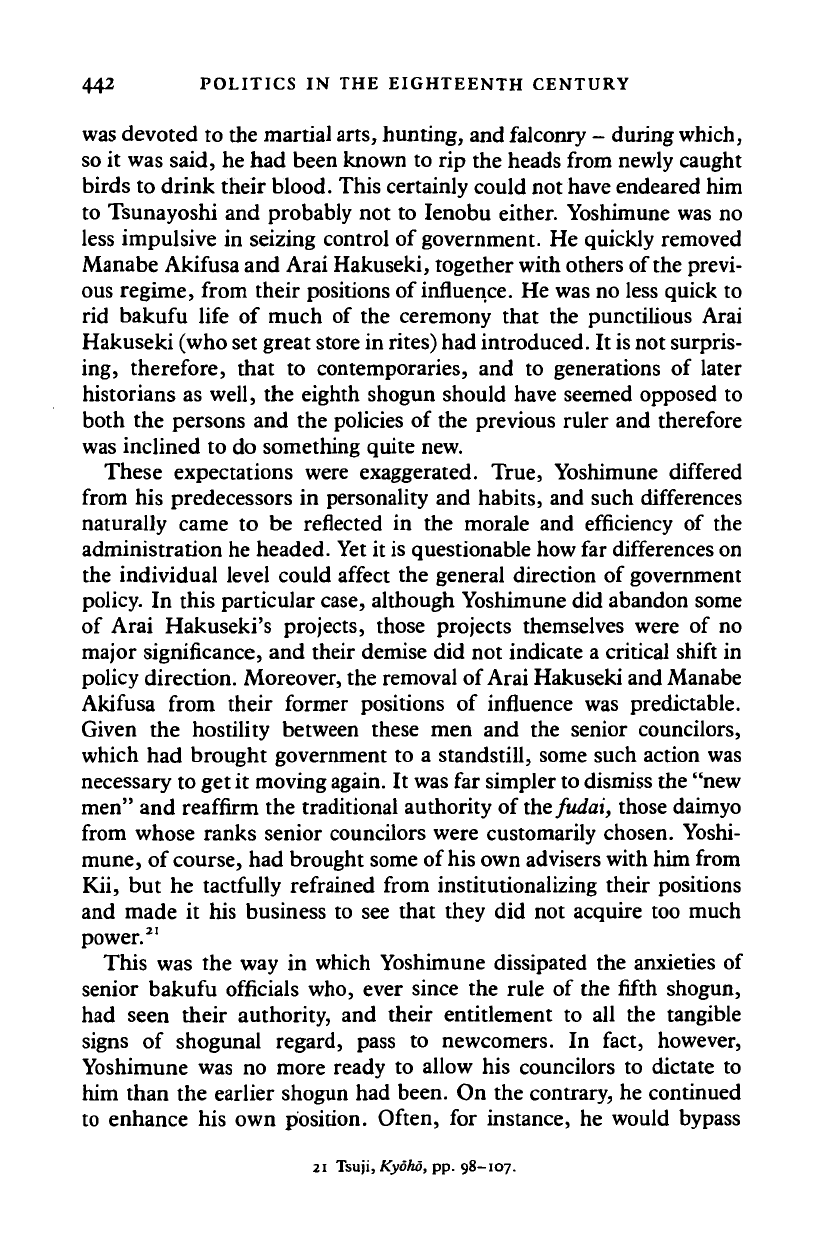
442 POLITICS IN THE EIGHTEENTH CENTURY
was devoted to the martial
arts,
hunting, and falconry - during which,
so it was said, he had been known to rip the heads from newly caught
birds to drink their blood. This certainly could not have endeared him
to Tsunayoshi and probably not to Ienobu either. Yoshimune was no
less impulsive in seizing control of government. He quickly removed
Manabe Akifusa and Arai Hakuseki, together with others of the previ-
ous regime, from their positions of influence. He was no less quick to
rid bakufu life of much of the ceremony that the punctilious Arai
Hakuseki (who set great store in rites) had introduced. It is not surpris-
ing, therefore, that to contemporaries, and to generations of later
historians as well, the eighth shogun should have seemed opposed to
both the persons and the policies of the previous ruler and therefore
was inclined to do something quite new.
These expectations were exaggerated. True, Yoshimune differed
from his predecessors in personality and habits, and such differences
naturally came to be reflected in the morale and efficiency of the
administration he headed. Yet it is questionable how far differences on
the individual level could affect the general direction of government
policy. In this particular case, although Yoshimune did abandon some
of Arai Hakuseki's projects, those projects themselves were of no
major significance, and their demise did not indicate a critical shift in
policy direction. Moreover, the removal of Arai Hakuseki and Manabe
Akifusa from their former positions of influence was predictable.
Given the hostility between these men and the senior councilors,
which had brought government to a standstill, some such action was
necessary to get it moving
again.
It was far simpler to dismiss the "new
men" and reaffirm the traditional authority of the fudai, those daimyo
from whose ranks senior councilors were customarily chosen. Yoshi-
mune, of
course,
had brought some of his own advisers with him from
Kii,
but he tactfully refrained from institutionalizing their positions
and made it his business to see that they did not acquire too much
power.
21
This was the way in which Yoshimune dissipated the anxieties of
senior bakufu officials who, ever since the rule of the fifth shogun,
had seen their authority, and their entitlement to all the tangible
signs of shogunal regard, pass to newcomers. In fact, however,
Yoshimune was no more ready to allow his councilors to dictate to
him than the earlier shogun had been. On the contrary, he continued
to enhance his own position. Often, for instance, he would bypass
21 Tsuji, Kyoho, pp. 98-107.
Cambridge Histories Online © Cambridge University Press, 2008
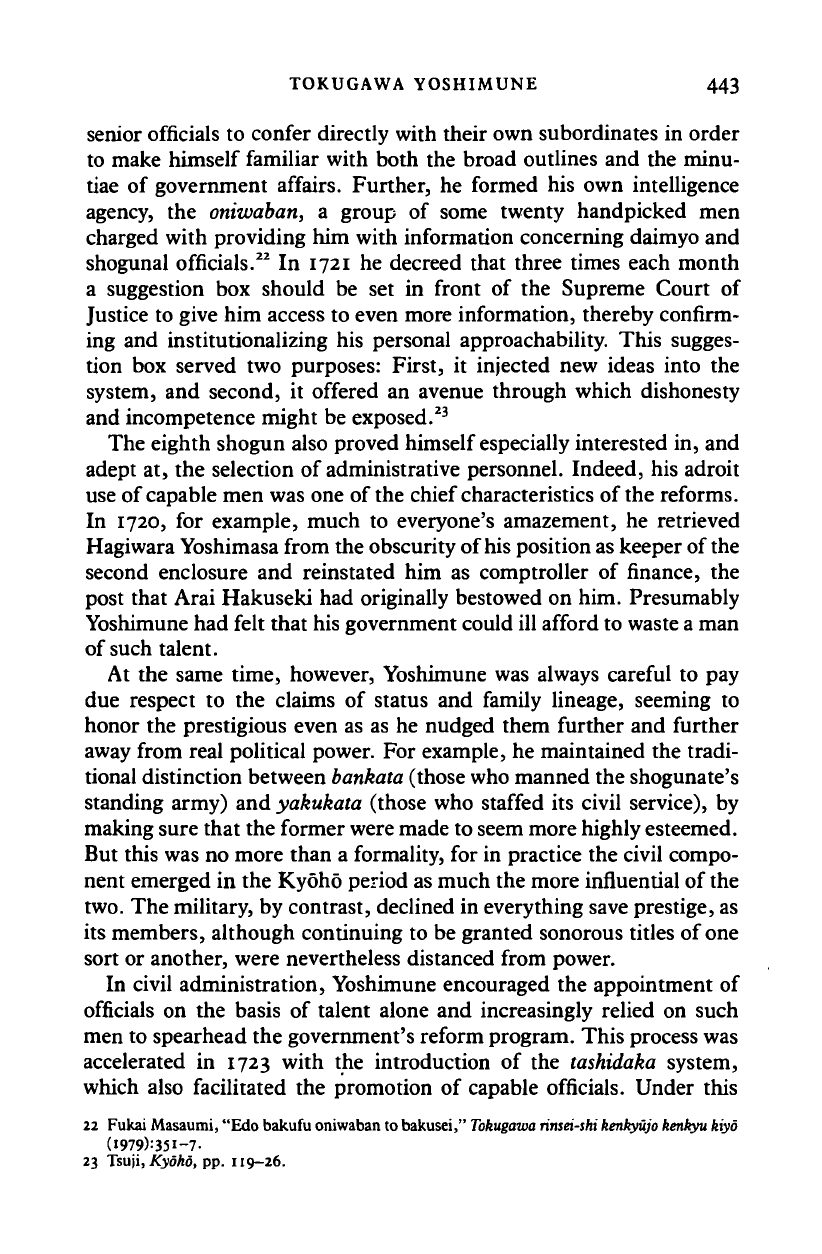
TOKUGAWA YOSHIMUNE 443
senior officials to confer directly with their own subordinates in order
to make himself familiar with both the broad outlines and the minu-
tiae of government affairs. Further, he formed his own intelligence
agency, the oniwaban, a group of some twenty handpicked men
charged with providing him with information concerning daimyo and
shogunal officials.
22
In 1721 he decreed that three times each month
a suggestion box should be set in front of the Supreme Court of
Justice to give him access to even more information, thereby confirm-
ing and institutionalizing his personal approachability. This sugges-
tion box served two purposes: First, it injected new ideas into the
system, and second, it offered an avenue through which dishonesty
and incompetence might be exposed.
23
The eighth shogun also proved himself especially interested in, and
adept at, the selection of administrative personnel. Indeed, his adroit
use of capable men was one of the chief characteristics of the reforms.
In 1720, for example, much to everyone's amazement, he retrieved
Hagiwara Yoshimasa from the obscurity of his position as keeper of the
second enclosure and reinstated him as comptroller of finance, the
post that Arai Hakuseki had originally bestowed on him. Presumably
Yoshimune had felt that his government could ill afford to waste a man
of such talent.
At the same time, however, Yoshimune was always careful to pay
due respect to the claims of status and family lineage, seeming to
honor the prestigious even as as he nudged them further and further
away from real political power. For example, he maintained the tradi-
tional distinction between
bankata
(those who manned the shogunate's
standing army) and yakukata (those who staffed its civil service), by
making sure that the former were made to seem more highly esteemed.
But this was no more than a formality, for in practice the civil compo-
nent emerged in the Kyoho period as much the more influential of the
two.
The military, by contrast, declined in everything save prestige, as
its members, although continuing to be granted sonorous titles of one
sort or another, were nevertheless distanced from power.
In civil administration, Yoshimune encouraged the appointment of
officials on the basis of talent alone and increasingly relied on such
men to spearhead the government's reform program. This process was
accelerated in 1723 with the introduction of the tashidaka system,
which also facilitated the promotion of capable officials. Under this
22 Fukai Masaumi, "Edo bakufu oniwaban to bakusei,"
Tokugawa
rinsei-shi
kenkyujo kenkyu
kiyo
(l979):35i-7.
23 Tsuji, Kyoho, pp. 119-26.
Cambridge Histories Online © Cambridge University Press, 2008
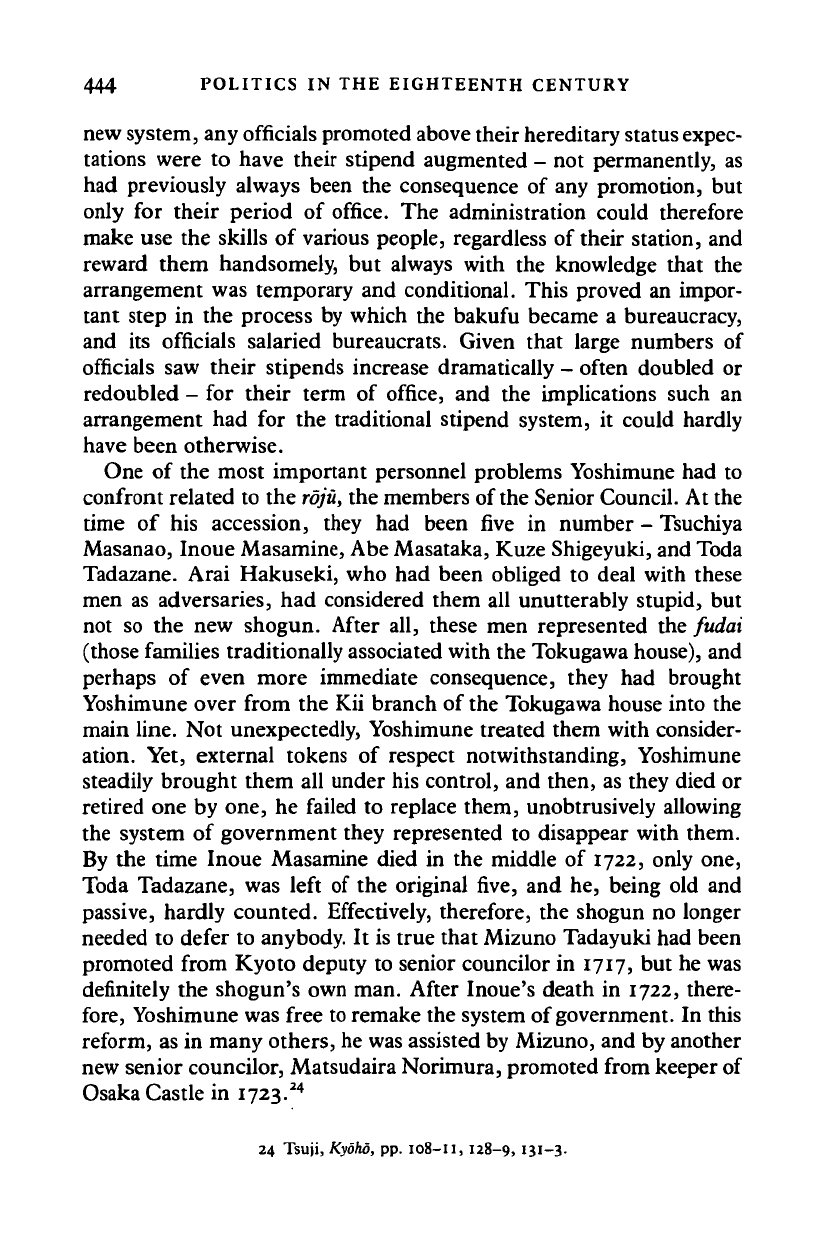
444 POLITICS IN THE EIGHTEENTH CENTURY
new system, any officials promoted above their hereditary status expec-
tations were to have their stipend augmented - not permanently, as
had previously always been the consequence of any promotion, but
only for their period of office. The administration could therefore
make use the skills of various people, regardless of their station, and
reward them handsomely, but always with the knowledge that the
arrangement was temporary and conditional. This proved an impor-
tant step in the process by which the bakufu became a bureaucracy,
and its officials salaried bureaucrats. Given that large numbers of
officials saw their stipends increase dramatically - often doubled or
redoubled - for their term of office, and the implications such an
arrangement had for the traditional stipend system, it could hardly
have been otherwise.
One of the most important personnel problems Yoshimune had to
confront related to the
roju,
the members of the Senior Council. At the
time of his accession, they had been five in number - Tsuchiya
Masanao, Inoue Masamine, Abe Masataka, Kuze Shigeyuki, and Toda
Tadazane. Arai Hakuseki, who had been obliged to deal with these
men as adversaries, had considered them all unutterably stupid, but
not so the new shogun. After all, these men represented the fudai
(those families traditionally associated with the Tokugawa house), and
perhaps of even more immediate consequence, they had brought
Yoshimune over from the Kii branch of the Tokugawa house into the
main line. Not unexpectedly, Yoshimune treated them with consider-
ation. Yet, external tokens of respect notwithstanding, Yoshimune
steadily brought them all under his control, and then, as they died or
retired one by one, he failed to replace them, unobtrusively allowing
the system of government they represented to disappear with them.
By the time Inoue Masamine died in the middle of 1722, only one,
Toda Tadazane, was left of the original five, and he, being old and
passive, hardly counted. Effectively, therefore, the shogun no longer
needed to defer to anybody. It is true that Mizuno Tadayuki had been
promoted from Kyoto deputy to senior councilor in 1717, but he was
definitely the shogun's own man. After Inoue's death in 1722, there-
fore,
Yoshimune was free to remake the system of government. In this
reform, as in many others, he was assisted by Mizuno, and by another
new senior councilor, Matsudaira Norimura, promoted from keeper
of
Osaka Castle in
1723.
24
24 Tsuji, Kyoho, pp. 108-11, 128-9, 131—3-
Cambridge Histories Online © Cambridge University Press, 2008
